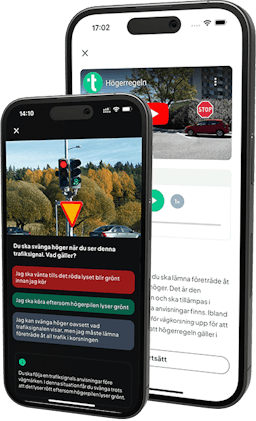Alcohol is the cause of many accidents on the roads. The more alcohol you consume, the worse your ability to drive will be. Your judgement will also be impaired, leading you to make decisions that you might not make otherwise. If you are under the influence of alcohol and your friends are pestering you, then you might decide to drive even though you know it is a bad idea and illegal.
Negative Effects of Alcohol
- Tiredness increases
- Judgement is impaired
- Peripheral vision is impaired
- Ability to react is impaired
- You overestimate your ability to drive
- You underestimate the risk of having an accident
- Coordination is impaired
- Perception of reality is impaired
- Increased sensitivity to light, which increases your risk of being dazzled

Level of Intoxication
The effects of a certain amount of alcohol can vary from person to person. Two people who drink the same amount of alcohol can therefore become intoxicated to a different extent.
Factors that affect how intoxicated you become:
- Weight: The less you weigh, the more intoxicated you will become.
- Gender: The same amount of alcohol will usually have a greater effect on a woman than it will on a man.
- Full/empty stomach: If you haven’t eaten anything, alcohol will affect you more.
- How often you drink: If you do not drink very often then you will be affected more.
- How quickly you drink: If you drink a certain amount of alcohol in ten minutes, for example, it will affect you more than if you take an hour to drink the same amount.
In addition to these factors, there are many other things that can affect how intoxicated you may become. It is therefore difficult to judge how much you will be affected by a certain amount of alcohol.

Metabolism
Alcohol is metabolised and gradually cleared out of your body. There are many rumours about how you can speed up this process, such as eating, exercising or drinking coffee. These rumours are all false. Alcohol metabolism cannot be speeded up.
If you drink a large amount of alcohol in the evening, there is a risk that you will still have a small amount in your blood system the morning after (about 0.2 per mille). This means you can be convicted of drunk driving, even though you haven’t had anything to drink that day. To be on the safe side, you should therefore refrain from driving in the morning if you have consumed alcohol the night before.

Laws and Penalties
- Under 0.2 per mille: You can be convicted of drunk driving if the police consider that you are unable to drive your vehicle safely, even if you have less than 0.2 per mille in your blood system.
- Over 0.2 per mille: At this level, you will be convicted of drunk driving. The penalty will be in the form of a fine or up to six months in prison. In most cases, your licence will also be revoked. Exception: Even if you do not have more than 1.0 per mille in your blood system, you can be convicted of aggravated drunk driving if you have caused an accident.
- Over 1.0 per mille: At this level, you will be convicted of aggravated drunk driving. The penalty is up to two years in prison and revocation of your driving licence. The penalty can go up to as much as eight years in prison if the driver is guilty of involuntary manslaughter.
Complicity in drunk driving
If you lend your car to somebody who is under the influence of alcohol then you can be punished for this. You can also be punished for providing alcohol to somebody who you know will be driving later.
Alcolocks
If you have been convicted of drunk driving or aggravated drunk driving and had your licence revoked, you can apply to drive a car with an alcolock fitted. You will then receive a conditional licence allowing you to drive the car that the alcolock is fitted to.

To start a car with an alcolock attached, you will need to first use a breathalyser. This means that it will not be possible to start the car if you are under the influence of alcohol. If you try to start the car with alcohol in your system then this will be registered and your driving licence will be revoked.
The alcolock must be inspected by a certified garage once per month during the conditional period. You will also need to be seen by a doctor every three months to have your alcohol intake examined. You will be required to cover all costs for alcolocks, vehicle inspections and doctor examinations.
Statistics and Research on Alcohol and Driving
- Around 75 people die in alcohol-related accidents each year.
- Approximately one in five drivers killed on the roads have alcohol in their system.
- At least one funeral per week is for a fatality who has died from drinking and driving.
- Men tend to drive under the influence of alcohol more often than women.
- Alcohol is involved in around 50% of single vehicle accidents that result in death.
What certain amounts of beer or wine equate to in strong spirits (40%)
- 1 can of light beer (50cl, 3.5%) is equivalent to around 4.5 cl of a strong spirit.
- 1 can of strong beer (50cl, 5.6%) is equivalent to around 7cl of a strong spirit.
- 1 glass of red wine (18cl, 12%) is equivalent to around 5.5cl of a strong spirit.
- Half a bottle of red wine (37cl, 12%) is equivalent to around 11cl of a strong spirit.



